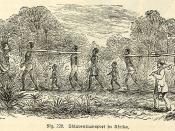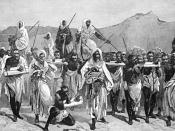In the earlier years of American colonialism, slavery was not very common because of the dependence on indentured servants. However, as indentured servitude became a less reliable source of labor, southern plantation owners turned to slave labor. Economic, geographic, and social factors all contributed to the growth and spread of slavery in the southern colonies between 1607 and 1775.
The growth of the economy in the Americas made slaves an essential part of the labor force during that time period. As plantation owners in the south were becoming richer and wealthier with their successful cash crops such as tobacco and rice, they were able to actually afford the rare and expensive African slaves. Prior to this influx in economy, plantation owners could not afford slaves at all; instead, they had to use unreliable and cheap indentured servants for labor. In addition, in 1698, the Royal African Company lost its crown-granted monopoly on the African slave trade, allowing the American colonists to pounce on the opportunity to deal with the profitable slave trade.
Because slaves were wanted everywhere in the world, including the American colonies, the slave trade was a source of easy money.
The geographic structure of the southern colonies also contributed to the demand for slavery. In the south, there were long, hot growing seasons with flat, rich soil. Because the plantations were spread out across the land, the need for many laborers was necessary. Not only were they able to cover much land, but they were also able to work in extremely hot climate in the south. Slaves served as the perfect labor force in these conditions because they were accustomed to the heat from their native land. As a result, the slaves worked much more efficiently and quicker than the former indentured servants. Black slaves were...


